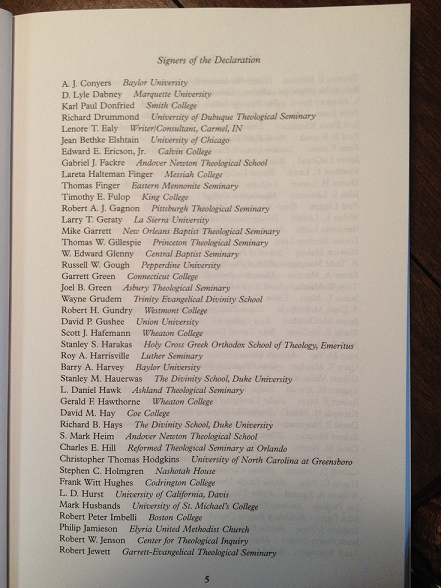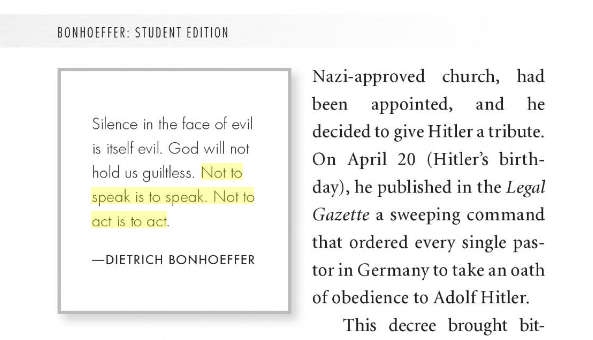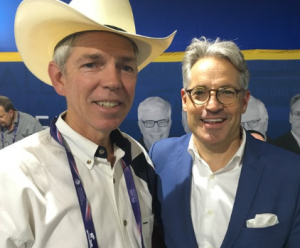Wayne Grudem caused quite a stir with his endorsement of Donald Trump last week. Matthew Boedy responded on this blog yesterday with a brief analysis of Grudem’s rhetoric. Others have come out in favor of Grudem’s reasoning and still others have expressed sharp disappointment.
Last night, a Twitter user asked what Grudem thought of Bill Clinton’s impeachment. Curious, I looked for something on the subject and found this Baptist Press article from 1998 which included reaction to the Clinton scandal. Grudem was mentioned as a signer of a statement from 150 Christian scholars on the subject:
More than 150 scholars — many whose schools are not identified with conservative Christianity — affirmed a statement declining to take a position on impeachment or resignation but expressing concern the religion community is in danger of providing “authentication for a politically motivated and incomplete repentance that seeks to avert serious consequences for wrongful acts.” The signers included Jean Bethke Elshtain of the University of Chicago, Wayne Grudem of Trinity Evangelical Divinity School, Robert Gundry of Westmont College, Stanley Hauerwas of Duke University, Eugene Merrill of Dallas Theological Seminary, Max Stackhouse of Princeton Theological Seminary and Timothy Weber of Northern Baptist Theological Seminary. Signers from schools affiliated with the Southern Baptist Convention or state Baptist conventions were A.J. Conyers and Barry Harvey, both of Baylor University; Mike Garrett of New Orleans Baptist Theological Seminary; David Gushee of Union University; and Mark Seifrid of Southern Seminary.
The statement is fascinating. Acknowledging that I am biased, I nonetheless believe I see a shift from then to now in the willingness to tolerate character problems for political expediency. Read it and see what you think.
Declaration concerning religion, ethics, and the crisis in the Clinton presidency
The following declaration can be found at moral-crisis.org, November 16, 1998
To be released on 13 November 1998
As scholars interested in religion and public life, we protest the manipulation of religion and the debasing of moral language in the discussion about presidential responsibility. We believe that serious misunderstandings of repentance and forgiveness are being exploited for political advantage. The resulting moral confusion is a threat to the integrity of American religion and to the foundations of a civil society. In the conviction that politics and morality cannot be separated, we consider the current crisis to be a critical moment in the life of our country and, therefore, offer the following points for consideration:
1. Many of us worry about the political misuse of religion and religious symbols even as we endorse the public mission of our churches, synagogues, and mosques. In particular we are concerned about the distortion that can come by association with presidential power in events like the Presidential Prayer Breakfast on September 11. We fear the religious community is in danger of being called upon to provide authentication for a politically motivated and incomplete repentance that seeks to avert serious consequences for wrongful acts. While we affirm that pastoral counseling sessions are an appropriate, confidential arena to address these issues, we fear that announcing such meetings to convince the public of the President’s sincerity compromises the integrity of religion.
2. We challenge the widespread assumption that forgiveness relieves a person of further responsibility and serious consequences. We are convinced that forgiveness is a relational term that does not function easily within the sphere of constitutional accountability. A wronged party chooses forgiveness instead of revenge and antagonism, but this does not relieve the wrong-doer of consequences. When the President continues to deny any liability for the sins he has confessed, this suggests that the public display of repentance was intended to avoid political disfavor.
3. We are aware that certain moral qualities are central to the survival of our political system, among which are truthfulness, integrity, respect for the law, respect for the dignity of others, adherence to the constitutional process, and a willingness to avoid the abuse of power. We reject the premise that violations of these ethical standards should be excused so long as a leader remains loyal to a particular political agenda and the nation is blessed by a strong economy. Elected leaders are accountable to the Constitution and to the people who elected them. By his own admission the President has departed from ethical standards by abusing his presidential office, by his ill use of women, and by his knowing manipulation of truth for indefensible ends. We are particularly troubled about the debasing of the language of public discourse with the aim of avoiding responsibility for one’s actions.
4. We are concerned about the impact of this crisis on our children and on our students. Some of them feel betrayed by a President in whom they set their hopes while others are troubled by his misuse of others, by which many in the administration, the political system, and the media were implicated in patterns of deceit and abuse. Neither our students nor we demand perfection. Many of us believe that extreme dangers sometimes require a political leader to engage in morally problematic actions. But we maintain that in general there is a reasonable threshold of behavior beneath which our public leaders should not fall, because the moral character of a people is more important than the tenure of a particular politician or the protection of a particular political agenda. Political and religious history indicate that violations and misunderstandings of such moral issues may have grave consequences. The widespread desire to “get this behind us” does not take seriously enough the nature of transgressions and their social effects.
5. We urge the society as a whole to take account of the ethical commitments necessary for a civil society and to seek the integrity of both public and private morality. While partisan conflicts have usually dominated past debates over public morality, we now confront a much deeper crisis, whether the moral basis of the constitutional system itself will be lost. In the present impeachment discussions, we call for national courage in deliberation that avoids ideological division and engages the process as a constitutional and ethical imperative. We ask Congress to discharge its current duty in a manner mindful of its solemn constitutional and political responsibilities. Only in this way can the process serve the good of the nation as a whole and avoid further sensationalism.
6. While some of us think that a presidential resignation or impeachment would be appropriate and others envision less drastic consequences, we are all convinced that extended discussion about constitutional, ethical, and religious issues will be required to clarify the situation and to enable a wise decision to be made. We hope to provide an arena in which such discussion can occur in an atmosphere of scholarly integrity and civility without partisan bias.
Grudem said Trump is a good candidate with flaws. He said one could support a flawed candidate if one believed it would do the most good. The 1998 statement said:
We are aware that certain moral qualities are central to the survival of our political system, among which are truthfulness, integrity, respect for the law, respect for the dignity of others, adherence to the constitutional process, and a willingness to avoid the abuse of power. We reject the premise that violations of these ethical standards should be excused so long as a leader remains loyal to a particular political agenda and the nation is blessed by a strong economy. Elected leaders are accountable to the Constitution and to the people who elected them. By his own admission the President has departed from ethical standards by abusing his presidential office, by his ill use of women, and by his knowing manipulation of truth for indefensible ends. We are particularly troubled about the debasing of the language of public discourse with the aim of avoiding responsibility for one’s actions.
To my eye, a vote for Trump contradicts every paragraph in this statement. The religious leaders in 1998 questioned Clinton’s repentance. Trump says he doesn’t ask for forgiveness. In 1998, the leaders feared authenticating a political leader, now they rush to do it. In 1998, the leaders affirmed certain virtues (truthfulness, integrity, respect for the law, respect for the dignity of others, adherence to the constitutional process, and a willingness to avoid the abuse of power). Now, pro-Trump Christian leaders excuse the absence of them or make a pragmatic bet that they aren’t important enough to stand for. This assertion from 1998 applies today:
But we maintain that in general there is a reasonable threshold of behavior beneath which our public leaders should not fall, because the moral character of a people is more important than the tenure of a particular politician or the protection of a particular political agenda. Political and religious history indicate that violations and misunderstandings of such moral issues may have grave consequences. (emphasis mine)
People like James Dobson, Eric Metaxas and now Wayne Grudem are telling us that it is our duty to throw this reasoning aside and lower or abandon the threshold.
I still believe there is a “reasonable threshold of behavior beneath which our public leaders should not fall.” And I believe that the “moral character of a people is more important than the tenure of a particular politician.” In this case, I believe these principles are more important than getting Donald Trump elected or furthering whatever aspect of a political agenda of importance to those who support him.
UPDATE: A question has come to me about Wayne Grudem’s status as a signer of the above Declaration. The Declaration was the subject of a 1999 book edited by Gabriel Fackre and titled Judgment Day at the White House. On page 5, about mid-way down the page is Grudem’s name on a list of signers of the Declaration (See also this image). Thanks to Declaration signer Barry Harvey for the image.





